In English we have a saying – the way to a man’s heart is through his stomach. But here in Badalona, you might say it’s through the ears.
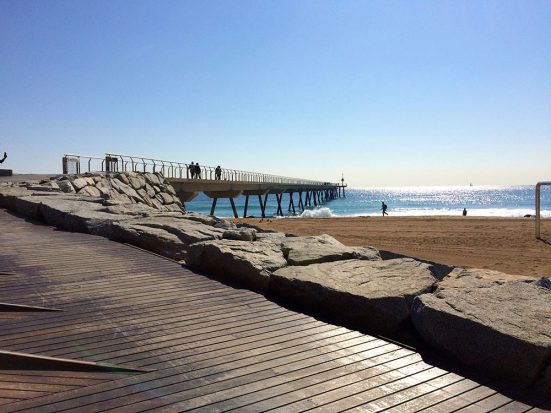
Pont del Petroli, Badalona. This place is so perfect, I feel like showing you this photo is tantamount to bragging, I live in paradise.
Attempting to speak Catalan is the best way I’ve found to win smiles from vendors in the shops near my apartment. As I step into the street on a cloudless Saturday, I juggle new phrases for breakfast foods, but I find that the sound of the train rushing by on its way to Barcelona sends these precariously held sounds flying from my brain. No pasa nada – I consult my notebook as I walk toward the market.
The strong sense of national identity that is evident in the Catalan flags and pro-independència graffiti scattered about Badalona has found perhaps its strongest expression through language. This tradition dates back to decades of oppression during the 20th century, when speaking Catalan was looked down upon or even outright banned in dictatorial efforts to create the illusion of a homogenous “Spanish” culture. Since Franco’s death in 1975, Catalan has become compulsory in the region’s schools and remains a point of cultural pride.
Que vagi bé. I try out the phrase on the particularly nice bread vendor after paying for my croissant. It’s an upgrade from my standard goodbye. In the first few days, I stumbled over even those three simple syllables – my tongue struggling to find adéu when it wants to say adios.
Walking back from el mercat, loaded with plàtans, pomes, and taronjas, I find that the snippets of conversation going on around me are just barely comprehensible. I witness several reunions within just a few blocks. It seems everyone knows someone, but no one knows me. I am accompanied only by the anonymity that solo travelers are familiar with.
Back in my apartment, I stow away the week’s groceries and fix myself a quick breakfast of oatmeal and fresh fruit. I eat at the living room table, where there is an incredible view of the sea and people milling about in the street below. This morning, like all the others since my recent arrival in Spain, I sip an espresso made from my little coffeemaker – one long pull and one short – and try not to miss American coffee.
An American coffee is not an Americano. First, there’s the size. American coffees can be cradled, enjoyed slowly over a lingering breakfast or several chapters of a good book or, more realistically, the better part of an otherwise unenriching office meeting. With drip coffee, there’s richness in every sip while the watery element of an Americano sits differently on the tongue. I’ve heard Costa Coffee is one of the very few places in this city that serves up a good old-fashioned, if out-of-place, American cup of Joe. I’ll have to go soon before I levy this rant upon the unsuspecting ears of every person I know.
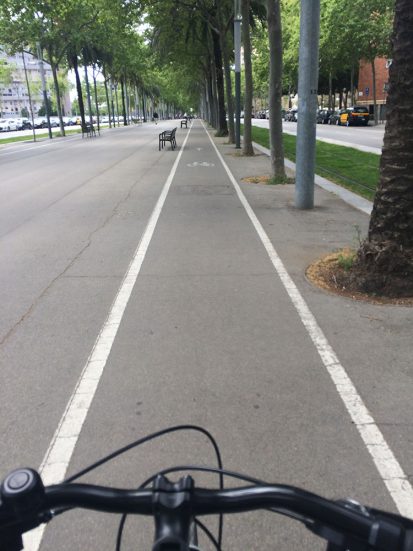
Avinguda Diagonal once again
The view from the window is entrancing, and before I know it, it’s rolled past 10:30. Dishes in the sink, and I’m out the door to meet my friend Marion at 11. One of the few downsides of living in Badalona – it takes a long time to get anywhere. At Sant Adrià, I exchange train for tram and then exit under the palm trees of Avenida Diagonal.
The double cheek kiss and some qué tals later, my friend Marion and I are on our way to the bike shop. Though her native language is French and her English is nearly as good as mine, we speak almost exclusively in Spanish.
After picking up the bikes, we careen down Diagonal and only slow up at the base of the sparkling façade of the Museu de Ciències Naturals. We pull off the bike path at Parc Fluvial del Besòs to check out some of the street art on the retaining wall. Away from the restrictive laws of Barcelona, expansive murals and artful tags flourish in Sant Adrià, Badalona, and the construction sites in between. The area gets to be so much more beautiful once you start seeing the graffiti as art.
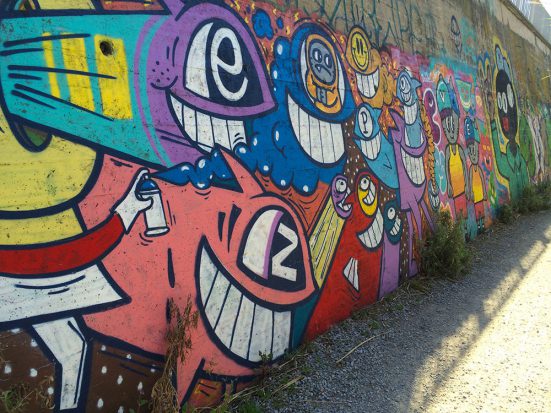
Work by El Pez, Le Chat Noir, and El Xupet Negre
Once past Sant Adrià, it’s not far to the marina, and then we find ourselves dodging a stream of Badalona residents enjoying the sunshine on the Passeig Marítim. It makes more sense to get off our bikes and walk. We chain them to a lamppost and head for Pont del Petroli.
Though the water is still quite cold, we sit on the shore and watch a few kids splash in and out of the waves as we discuss the pros and cons of opening a bike rental business in Badalona. On the list of pros: the Passeig Marítim makes for an excellent bike path, charting a course from Ciutat Vella up to interesting northern towns I haven’t yet visited like El Masnou and Mataró. On the other hand, a bike rental shop is the domain of tourists, and few make it out this far from Barcelona.
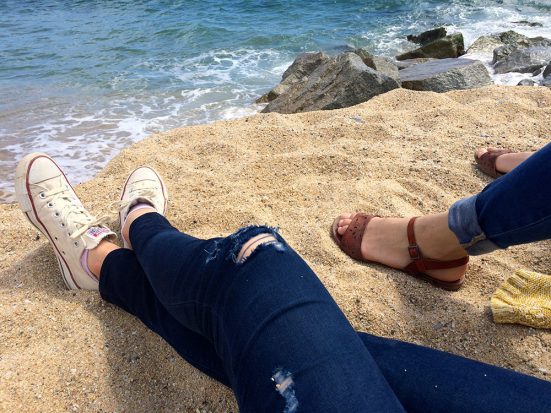
Entry 927,201 re: Why would you live anywhere else?
Since moving here, that’s been something that has puzzled me. Badalona is gorgeous, with high quality commercial streets and a better beach than you can find anywhere in Barcelona. Why is anyone turning up their nose at the name of my new town?
I think this debate opens up a number of paradoxes surrounding tourism. Like many travelers, I have a bit of disdain for my own kind, preferring, in theory at least, to seek out the company of locals. This lends itself to a desire to get to a place first, before the herds discover it, and to have an experience that is interesting but authentic. Of course, authenticity is hard to nail down. For example, when I couch surfed in Valencia, I ended up joining my hostess for a lindy hop class, a type of dancing that originated in Harlem in the 1920s. Though it wasn’t what I’d been expecting, this night out was more authentic to her experience in the city than if we’d gone to dance Fandango. The kind of excursion that neatly encapsulates the history and culture of a place often requires careful planning by a tourist company. As far as I can tell, Badalona has put no effort into attracting the sorts of people who are looking for prepackaged cultural activities.
This conversation about business and the nature of travel maxes out my knowledge of Spanish. Thankfully, it’s getting close to an acceptable hour to eat lunch, and Marion and I return to our bikes. With the prospect of food ahead of me, I find myself frustrated by the slow pace of the crowds moving around us. Like the Washington, D.C. resident that I’ve been for the last year, I question why can’t they just walk a little more quickly. I force myself to take a deep breath, and my thoughts return to considering my approach to traveling. At minimum, being abroad has provided the opportunity to see that I don’t have to keep living the way that I had been. Whether the new cultural element is something I enjoy, like placing a premium on time spent with family and friends, or something I struggle with, like waiting to eat lunch at 1:30 or 2pm, I’ve at least got the option to incorporate it into life after I return.
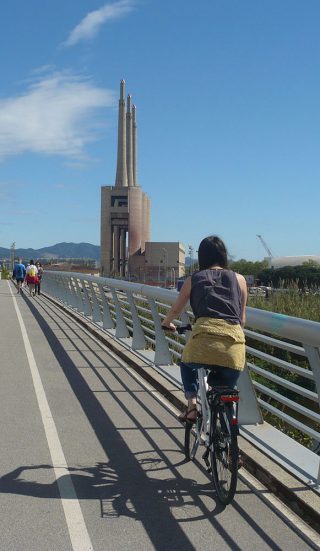
On the road to Badalona, La Central Tèrmica in the distance
We hit La Rambla for tapas while watching the water sparkle off the waves. I want to stay forever in this postcard world. At the same time, there are so many interesting spots nearby I wish we could visit – like the charming Jardí Històric de Can Solei or further down the Passeig Marítim where there is a gorgeous grassy hill overlooking the ocean beyond Mongat. Unfortunately, we have to return the bikes and get on with the day.
We take the train past a flickering exhibition of public art on construction sites between Badalona and the city, then emerge at Arc de Triomf. After speedily biking back to Poblenou to avoid paying overage on our rentals, we part ways, Marion to return to the Earth Fair taking place in Parc de la Ciutadella and me to take the metro to my favorite weekend event, BCN Sunday Writers (which may or may not actually fall on a Sunday). The meetup challenges its participants to craft a piece of writing based on a word selected at random. The pressure of having only 15 minutes to craft a relatively polished piece to share with the group sets me on edge, and I find it helpful to jot down a few ideas I might write about on my way to the meetup.
For most of the metro journey, I am cocooned in my notes, though toward the end I look up and notice I am one of the few people on the train who seems to be doing something other than waiting. The patience with which Barcelonans approach public transit is something you would never see in D.C., where commuters are almost universally scrolling through email, scanning Politico, or reading something off the New York Times Nonfiction Bestseller list. Now that I’ve seen the contrast, I wonder how much of this activity is done with the purpose of appearing busy, filling every second of otherwise deadtime with an activity of questionable productive value.
Though it’s a quarter-hour past the start time when I hurriedly pace into the cafe, the other writers are leisurely milling about, ordering coffee and chatting amongst themselves at the big table downstairs. After a round of introductions, we begin to write. Though I’m less pleased with this week’s efforts than last week’s, the meetup is always good for hearing interesting work and flexing some creative muscles.
Afterwards, I had planned to meet with a new conversation partner. But because there is no such thing as a perfect day, he sent me a WhatsApp message canceling our appointment. Instead I head back to Badalona to workout before dinner. Rather than taking the Passeig Marítim as I usually do, I set out toward the town center. It feels good to be running off the soreness of bicycling, and I feel my stride lengthen as my shoes pound the sidewalk. I turn to investigate a pretty church on a hill and find myself ensconced in the winding streets of old town. Wondering why it took me so long to discover this beautiful trail, I slow down to take in the views of peaceably curved walkways and windowsill gardens. When the lovely pedestrian corridor spits me out at a busy street, it feels like I’ve exchanged one era for another. Briefly disappointed at my reemergence into modern times, I turn and continue uphill.
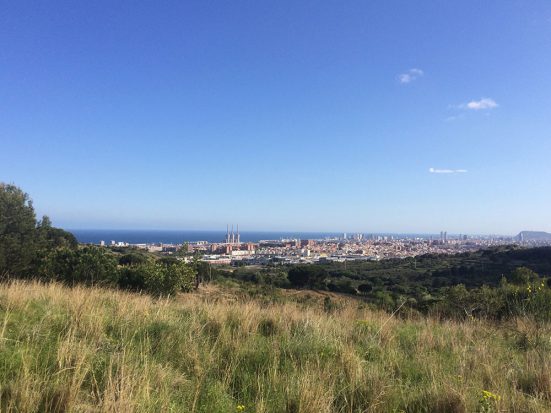
View from the top at Parc de la Serralada de Marina
Beyond the highway, the streets get less busy, and my heart lifts at the sight of uninterrupted greenery on the hillside up ahead. I crest one hill, planning to turn around at the top, but I see a monastery nestled in the valley below, and choose to keep running until I reach it. This is the kind of terrain that could make me into a marathoner – I’m reluctant to turn back before I’ve explored each mountainous path.
After an hour and a half, I return home for a salad dinner and catch up on some work afterward. Stretched out in my bed, I feel happily exhausted. In the morning I’ll lay the table for breakfast with fresh squeezed orange juice and raise the persianas on an incredible view of the sea.
 Nicole Janeway is a travel blogger, fiction writer, coffee lover (and hyphen hater). She writes for City Pass Project, your comprehensive guide to urban tourism across the world.
Nicole Janeway is a travel blogger, fiction writer, coffee lover (and hyphen hater). She writes for City Pass Project, your comprehensive guide to urban tourism across the world.
If you’d like to write your ‘Perfect Day in Barcelona’ then please get in touch via the email address at the bottom of this website. I’d love to hear from you. The more we have the better!











What do you think? Leave a comment